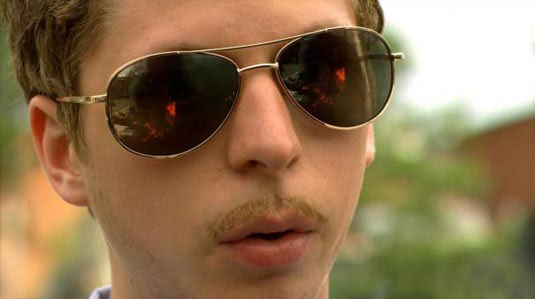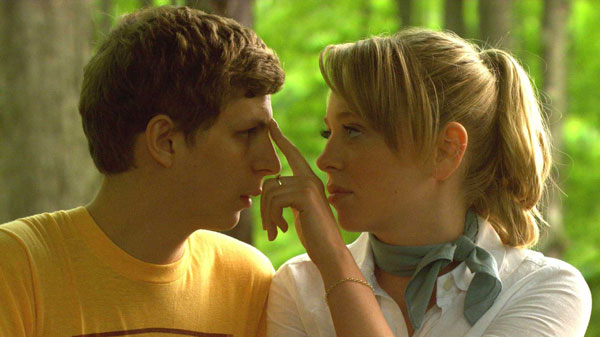Youth in Revolt (Weinstein Co.)
During the movie-going doldrums of January, a teenage rom-com emerges a cut above the schlock. It’s not a prolonged stint of anarchy as you might be—as I was—expecting. Instead, it’s got a quirky pulse and, for awhile at least, a deliciously nerdy vibe.
Michael Cera is his typical pillow-pasty self—only this time there’s no will to conform or even, for awhile at least, to reform. Of course, he’s still not “getting any,” even as his screen mother (Jean Smart) beds a revolving door of greasy guys and her ex-husband (Cera’s screen father, played by Steve Buscemi) enjoys a busty young blonde.
When Cera’s love-starved Nick Twisp meets the wistful Sheeni Saunders, played by ravishing newcomer Portia Doubleday, a wonderful depiction of young love and a delirious celebration of geekdom commence. They share in high-brow hobbies and feisty scholarly wordplay.
They’re an improbably compatible pair; that either could ever find another tuned to pitch so precisely seems just as improbable. Yet Sheeni holds out for her typified white knight: a certain scholar and connoisseur of all things French, with a slight devilish streak to boot. She lays it out for Nick: prove your love, embrace your inner James Dean, or she becomes a sumptuous summer memory. And here I thought things were working out pretty well between them!
The socially clumsy and regularly reserved Nick concocts an alter-ego named Francois to aid him in his task. Francois, rooted in irreverent confidence with pressed white pants and a peach fuzz pencil stache, sets out to cause chaos. Because nothing says “I love you” quite like causing millions of dollars in property damage and risking the lives of innocent people. Wait a tick: that doesn’t sound right. And yet in a suspiciously convenient twist of fate, the ordeal relocates Nick closer to his love, and Sheeni, somehow impressed, fights a little harder to be with Nick herself.
Much of the plot unveils in this way: our focal lovers face separation, Nick—ahem, Francois—drums up a seemingly unrelated disorder, and then our lovers are somehow, as a result of said disorder, reunited once more—only to face the next hurdle. It’s a frustrating setup that musters meager momentum.

The physics behind Francois aren’t entirely clear either. Is he Nick’s shadowy side? A repressed desire to revolt? A receptacle for unproductive rage? A schizophrenic-like delusion? Francois acts independently from, often in opposition to, his maker, as though he were a separate being entirely—while still expressing his will through Nick in the eyes of others. Either the script falls short on consistency, or Mr. Twisp needs some meds pronto. Or maybe I need some meds pronto for insisting on this level of scrutiny.
Thankfully, amid my picky perplexity, I reveled in hip humor aplenty: idiosyncrasies, razor-sharp quips, and an obligatory prudish-people-tripping-on-shrooms scene, reinvigorated by one particularly lewd hallucination borne of a Kama Sutra sketchbook. Cera and Doubleday have delightful chemistry, and they’re supported by a strong secondary slate—including The Hangover’s scruffy sketchball Zach Galifianakis, sidelining extraordinaire Steve Buscemi, and Fred Willard in a wonderfully weird and self-deprecating turn. Questionable plotting and fuzzy mathematics aside, Youth in Revolt is a sprightly send-up of the freaky and geeky.
Grade: B-
Directed by Miguel Arteta. Written by Gustin Nash, based on the novel by C.D. Payne.
Runtime is 1 hour, 30 minutes.
Tickets & Showtimes» Watch the Trailer» Visit the Website»






Leave a Reply
You must be logged in to post a comment.